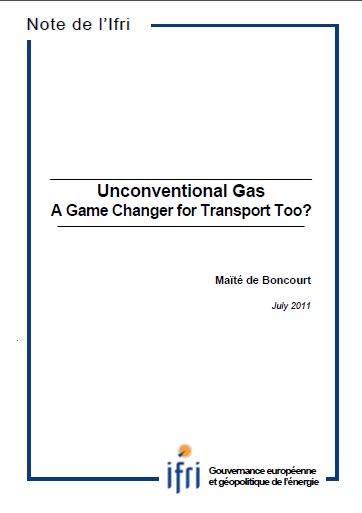Unconventional Gas: A Game Changer for Transport Too?

A new technology trend, the development of natural gas vehicles, is emerging in the transport sector.
While not new this technology is now being simultaneously revived by the discovery of significant amounts of unconventional gas, by the rise of oil prices, and by the decreased confidence in the sustainability of nuclear technology (and subsequent rising electricity prices in Europe). Natural gas could provide a path to a lower carbon intensive transport sector in both developed and developing countries. Gas is cheaper and less polluting than oil. It emits significantly less local pollutants than diesel and less CO2 than gasoline. Historically present in Italy, South America, Iran and Pakistan natural gas vehicles are emerging in other countries: in some European countries, in the United States, in the Chinese provinces of Shaanxi and Henan, and in India. Asia and developing countries are expected to be responsible for a large share of the car market growth in the next years and consequently for a significant share of transport CO2 emissions. The adoption of a given technology there could impact global markets and global CO2 emissions significantly. While the trend is still loose, this paper responds to the possibility that this technology will expand: what would it imply? would it compete with the development of the electric vehicle? is it desirable?
It appears that the advantages of natural gas vehicles are not as clear cut as they seem. Environmentally, they are beneficial only to countries with little -if no- CO2 emissions standards. Several issues including the development of costly infrastructures are likely to raise costs. Natural gas vehicles development could also slow down the roll out of electric vehicles, hence delaying hopes of smoothing the integration of renewables into the power grid through the use of car batteries" storage capacity. But the main concern is the availability of cheap gas itself, on the basis of which this technology shift could take place. Markets for gas are tightening, price increases have already been announced in many places, and the development of unconventional resources is still surrounded by uncertainties in regards to its cost and timeframe. But even more, gas might be more efficiently used for power generation. The trend is however still nascent. The targeted markets are niche markets, and many bottlenecks including the determination of some governments to promote the electric vehicle instead, would have to be overcome before variants of natural gas transportation technologies can sustainably and significantly secure a large share of vehicle fleets.

Available in:
Regions and themes
ISBN / ISSN
Share
Download the full analysis
This page contains only a summary of our work. If you would like to have access to all the information from our research on the subject, you can download the full version in PDF format.
Unconventional Gas: A Game Changer for Transport Too?
Related centers and programs
Discover our other research centers and programsFind out more
Discover all our analysesBrazil One Year Away from the October 2026 General Elections
Brazil’s general elections will be held on October 4, 2026, to elect the president, vice-president, members of the National Congress, governors, deputy governors and state legislative assemblies. For the presidential and gubernatorial elections, a second round will be held on October 25 if no candidate obtains a majority of the votes in the first round.
COP30: An Inflection Point for Climate Action and Governance
The 30th Conference of the Parties (COP30), opening in Belém, Brazil, on November 10th 2025, convenes at a perilous moment.
The Strategic Dimension of Skills in the Clean Industrial Deal
In the competitiveness and energy transition battles, the European Union (EU) must master a determinant factor: skills.
The Energy Transition Faces Geopolitical Challenges. How Can Ideological Divides Be Overcome?
President Trump’s positions and policies, combined with record coal consumption and booming global electricity demand, geo-economic confrontation, and widespread concerns about energy security, are changing the game when it comes to understanding realistic decarbonization trajectories. The war in Europe is intensifying competition between defense and transition budgets. This is also the case elsewhere in the world.











